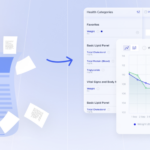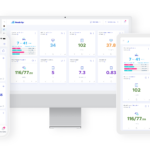Adopting a paleo-based diet and lifestyle can have tremendous benefits on your health. Improved body composition, increased energy levels, improved blood pressure and blood sugar, improved digestion and a diet that can be highly effective for managing chronic conditions (auto-immune, thyroid conditions, diabetes, hypertension and more) are just a few examples.
If you are considering paleo (or have already gone paleo) as a way to improve your health, there’s a number of different metrics you can use to quantify your progress.We will explore the most common metrics in this post.
Heads Up Health provides an app which can be used to track all of your health data. If you are ready to start logging your own data now, click the button below to create your account. Or, read on to learn more about the metrics you should consider tracking as you go paleo.
[maxbutton id=”1″]
Measuring your Paleo Progress
We’ll break down the metrics you should consider tracking into two main categories – the “at-home markers”, which you can measure easily on your own, and the “clinical markers”, which will require blood testing from your preferred doctor or lab testing center.
At-home Markers
- Blood sugar:
With blood sugar you will want to keep an eye on your fasting sugar (no food or drink for eight hours prior to test), which should start to come down on Paleo. Dr. Justin also recommends conducting periodic “functional glucose tolerance tests”. Simply record your blood sugar before, one hour after, two hours after and three hours after your favorite meal. Enter the data into your Heads Up profile along with a description of the meal you ate (figure 1). Much like fasting sugar, you should start to see the results from your functional glucose tolerance tests come down as your blood sugar begins to stabilize on the Paleo diet.
2. Body composition (weight and body fat percentage):
Tracking your weight and body fat percentage will give you a good sense of how your body composition is responding to Paleo. With Paleo, you are in essence re-programming your body’s metabolic machinery from storing fat to building lean muscle mass. Additionally, as your blood sugar and hormonal systems begin to stabilize on Paleo, this should also lead to improvements in body composition.
In some cases your weight may actually increase on Paleo because your are packing on lean muscle, which weighs more than fat. This is why it’s also important to track body fat percentage. If your weight is increasing but your body fat percentage is decreasing, this is a desirable effect as it indicates your body is getting leaner and stronger.
3. Blood pressure (optional)
A Paleo diet and lifestyle is an excellent starting place for those wishing to embrace a natural approach to lowering blood pressure. We know this because hypertension is virtually unheard of in hunter-gatherer and pastoralist cultures. High blood pressure can often be improved or even completely reversed by returning to a diet and lifestyle that is more consistent with our evolutionary heritage (1, 2).
4. Basal temperature (optional)
Basal temperature is a simple test that can be done at home to assess the health of your adrenal glands and your thyroid. The adrenal and thyroid glands are both critical components of our metabolic and hormonal systems. Among other things, they affect our ability to control weight and to regulate our energy throughout the day. They are also intricately connected with other systems in the body like our blood sugar control, which was referenced above.
When you are working with a trained healthcare professional who uses a Paleo approach to health, optimizing adrenal and thyroid function will be an important part of the process. Basal temperature is an excellent at-home marker you can use to track your progress.
For more information on how to use basal temperature testing to assess thyroid and adrenal health, please see this video.
Clinical markers
If possible, it is highly desirable to obtain lab testing before going Paleo and periodically throughout the process. Combined with the “At-home” markers, the “Clinical” markers help to tell the complete story of how your body and your overall health are changing on Paleo.
Dr. Justin’s top lab tests for Paleo are broken down into seven categories:
- Basic lipid panel: The lipid panel is especially important on Paleo, especially as you start to increase your dietary cholesterol and healthy fat intake on Paleo. The lipid panel will reveal how well your body is managing the new macronutrient breakdown and will also give cluse into whether or not there are other systems in the body (thyroid, adrenal, infections etc.) that need to be looked at.
- Dr J’s lipid markers: Cholesterol, HDL, LDL, triglycerides, triglyceride:HDL ration, Total:HDL ratio
- Blood sugar markers: In addition to “At-home” testing for glucose mentioned above, these tests will provide further information on how well your blood sugar mechanisms are improving on Paleo.
- Dr J’s blood sugar markers: Fasting glucose, hemoglobin A1c
- Inflammation: The Paleo diet is an excellent choice for reducing inflammation. These markers will help measure the effects.
- Dr J’s inflammation markers: hs-crp, fibrinogen, erythrocyte sedimentation rate (ESR), homocysteine
- Protein markers: These tests will look at the function of your liver and your kidneys.
- Dr J’s protein markers: creatinine, BUN, serum protein, albumin, globulin
- Iron levels: These tests will assess for anemia and for excess iron levels in the body.
- Dr J’s iron markers: Serum iron, ferritin, total iron-binding capacity, iron saturation, RBC, hemoglobin, hematocrit (HCT), mean corposcular volume (MCV), mean corposcular hemoglobin (MCH), mean corpuscular hemoglobin concentration (MCHC)
- Blood nutrients: Here Dr. Justin will be looking at Vitamin D levels and magnesium levels to test for any deficiencies.
- Dr J’s blood nutrients: 25-hydroxy vitamin D3, RBC magnesium
- Thyroid: Dr. Justin will run a full thyroid panel to assess the overall hormonal and metabolic health within the body.
- Dr J’s thyoird markers: tsh, T4 total, T4 free, T3 total, T3 free, reverse T3, thyroid antibodies
Heads Up Health makes it easy to track your clinical data alongside your at-home data. With all your data in one place, it’s easy to share it with your healthcare practitioner of choice to interpret these results, assess your progress and determine any adjustments that need to be made to your Paleo routine.
For those who would like to order their own lab panel, Dr. Justin has put together a package that includes all labs mentioned above (and more) for $299. Depending on your health insurance, you may also be able to submit the expense for reimbursement. Click here to order the lab panel.
Summary
The Paleo diet and other ancestral-based approaches can have tremendous benefits for overall health. Heads Up Health gives you the tools to easily track all your important data to assess your progress. Dr. Justin Marchegiani and other experts in the ancestral health community can be your guides on the Paleo journey. For any questions, please contact support@headsuphealth.com or visit JustinHealth.com. You can also visit www.primaldocs.com to find a local health practioner in your area who treats based on ancestral and Paleo principles.
[maxbutton id=”1″]
Appendix A – Recommended products and services
Glucose tracking:
- Traditional glucometer: Any glucometer should work fine. We recommend the Precision Xtra.
- Wireless: For a wireless model that can integrate with Heads Up Health, we recommend the iHealth BG5 model.
Body composition:
- Traditional body fat scale: The Tanita BF679W is accurate and very affordable.
- Wireless models: The FitBit Aria or the Withings WS50 can both wirelessly sync with your Heads Up account.
Blood pressure:
- Traditional blood pressure monitor: We’ve had good success with the Omron 10 series.
- Wireless models: For a wireless model, we recommend the Withings or iHealth wireless models.
Basal temperature:
- Dr. Justin recommends the iProven DT-K117A thermometer for basal body temperature testing.
Lab testing:
- Please work with your preferred health practitioner to order lab testing. You can contact Dr. Justin or find ancestral health practitioners in your area at www.primaldocs.com.




















